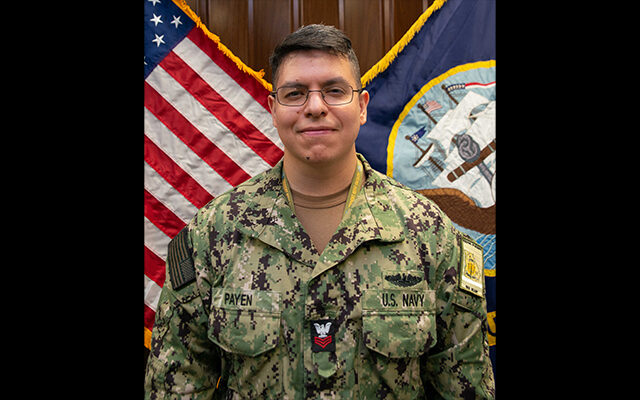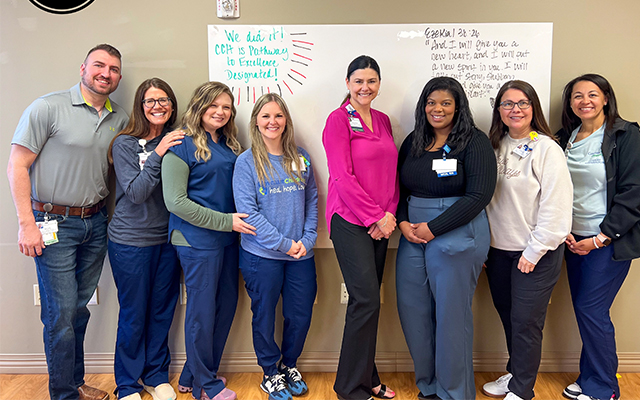Lubbock native supports a 123-year tradition of service under the sea

By Megan Brown, Navy Office of Community Outreach
KINGS BAY, Ga. – Submariners make up only 10 percent of the U.S. Navy’s personnel, but they play a critical role in carrying out one of the Defense Department’s most important missions: strategic deterrence. Petty Officer 1st Class Kevin Payen, a native of Lubbock, Texas, is one of the sailors supporting a 123-year tradition of service under the sea to help ensure Americans’ safety.
Payen joined the Navy six years ago and today serves as an information systems technician (submarines) with Trident Refit Facility Kings Bay.
“I joined the Navy to challenge myself, travel the United States and the world, and for financial stability,” said Payen.
Growing up in Lubbock, Payen attended Coronado High School and graduated in 2006.
Skills and values similar to those found in Lubbock are similar to those required to succeed in the military.
“My hometown taught me kindness, respect, patience and fortitude,” said Payen. “Lubbock is known as one of the friendliest places in America, so that is where I get my kindness from. My hometown is also well-known for high-rate weather. In the West Texas area, we get a lot of weather, so I learned to be resilient and overcome adversity.”
These lessons have helped Payen while serving in the Navy.
Known as America’s “Apex Predators!,” the Navy’s submarine force operates a large fleet of technically-advanced vessels. These submarines are capable of conducting rapid defensive and offensive operations around the world, in furtherance of U.S. national security.
There are three basic types of submarines: fast-attack submarines (SSN), ballistic-missile submarines (SSBN) and guided-missile submarines (SSGN). Fast-attack submarines are designed to hunt down and destroy enemy submarines and surface ships; strike targets ashore with cruise missiles; carry and deliver Navy SEALs; conduct intelligence, surveillance, and reconnaissance missions; and engage in mine warfare. The Virginia-class SSN is the most advanced submarine in the world today. It combines stealth and payload capability to meet Combatant Commanders’ demands in this era of strategic competition.
The Navy’s ballistic-missile submarines, often referred to as “boomers,” serve as a strategic deterrent by providing an undetectable platform for submarine-launched ballistic missiles. SSBNs are designed specifically for stealth, extended patrols and the precise delivery of missiles. The Columbia-class SSBN will be the largest, most capable and most advanced submarine produced by the U.S. – replacing the current Ohio-class ballistic-missile submarines to ensure continuous sea-based strategic deterrence into the 2080s.
Guided-missile submarines provide the Navy with unprecedented strike and special operation mission capabilities from a stealthy, clandestine platform. Each SSGN is capable of carrying 154 Tomahawk cruise missiles, plus a complement of heavyweight torpedoes to be fired through four torpedo tubes.
“Our mission remains timeless – to provide our fellow citizens with nothing less than the very best Navy: fully combat ready at all times, focused on warfighting excellence, and committed to superior leadership at every single level,” said Adm. Mike Gilday, Chief of Naval Operations. “This is our calling. And I cannot imagine a calling more worthy.”
Strategic deterrence is the Nation’s ultimate insurance program, according to Navy officials. As a member of the submarine force, Payen is part of a rich history of the U.S. Navy’s most versatile weapons platform, capable of taking the fight to the enemy in the defense of America and its allies.
Serving in the Navy means Payen is part of a team that is taking on new importance in America’s focus on strengthening alliances, modernizing capabilities, increasing capacities and maintaining military readiness in support of the National Defense Strategy.
“The Navy maintains and enforces our country’s liberties and freedoms,” said Payen.
With 90 percent of global commerce traveling by sea and access to the internet relying on the security of undersea fiber optic cables, Navy officials continue to emphasize that the prosperity of the United States is directly linked to trained sailors and a strong Navy.
Payen and the sailors they serve with have many opportunities to achieve accomplishments during their military service.
“My proudest Navy accomplishment is finishing my first tour aboard a fast attack submarine and keeping a positive attitude the whole time,” said Payen.
As Payen and other sailors continue to train and perform missions, they take pride in serving their country in the United States Navy.
“Serving in the Navy means having experiences and first-hand challenges that no other civilian job could have given me,” said Payen.
Payen is grateful to others for helping make a Navy career possible.
“I would like to thank my grandfather, Adan Padilla, and my parents, Alfred and Virginia Payen, for giving me values I use in the military and shaping me into the person that I am today,” added Payen.



